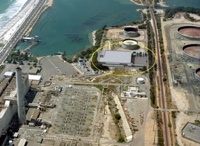 The Surfrider Foundation has definitely not thrown in the town on their opposition to the Poseidon Resources Desalination Plant scheduled to be built in the shores of Carlsbadistan’s Agua Hedionda Lagoon.
The Surfrider Foundation has definitely not thrown in the town on their opposition to the Poseidon Resources Desalination Plant scheduled to be built in the shores of Carlsbadistan’s Agua Hedionda Lagoon.
The environmental group filed a lawsuit on Earth Day (April 22, 2010) challenging a permit approved by the San Diego Regional Water Quality Control Board. Surfrider says that the “facility would kill countless marine organisms, with an illegal plan to replace these fish and other marine life through a restoration project somewhere else.”
“When the law says you must ‘minimize the intake and mortality’ of marine life, that doesn’t mean you can kill millions of marine organisms and then try to replace them somehow,” said Joe Geever, Surfrider Foundation’s California Policy Coordinator. “The Regional Water Quality Control Board misinterpreted the law, and it’s unfortunate the project has progressed this far without a final decision on the type of intake and facility design that meets California’s law to protect our precious marine environment.”
According to Michael Burge story in the San Diego Union-Tribune this is one of six lawsuits that have been filed regarding Poseidon’s plans for the lagoon. Three are still progress.
For the entire Surf Rider release, follow the jump or click here for Carlsbadistan’s coverage of the entire saga.
SURFRIDER FOUNDATION FILES SUIT AGAINST SAN DIEGO REGIONAL WATER QUALITY CONTROL BOARD
Lawsuit Challenges Poseidon Resources Permit
Surfrider Foundation filed a lawsuit yesterday against the San Diego Regional Water Quality Control Board challenging a permit allowing Poseidon Resources to withdraw 300 million gallons of seawater per day for the proposed Carlsbad ocean desalination plant. The complaint alleges that the proposed desalination facility must strictly comply with the California Water Code to minimize the intake and mortality of marine life.
As proposed, the desalination facility would kill countless marine organisms, with an illegal plan to replace these fish and other marine life through a restoration project somewhere else.
“When the law says you must ‘minimize the intake and mortality’ of marine life, that doesn’t mean you can kill millions of marine organisms and then try to replace them somehow,” said Joe Geever, Surfrider Foundation’s California Policy Coordinator. “The Regional Water Quality Control Board misinterpreted the law, and it’s unfortunate the project has progressed this far without a final decision on the type of intake and facility design that meets California’s law to protect our precious marine environment.”
Surfrider Foundation and San Diego Coastkeeper, as well as several State Attorney Generals and other environmental organizations, have been working with federal and state agencies for years to minimize marine life from the cooling water intake systems of coastal powerplants – like the one used at the Encina Power Station in Carlsbad. Numerous agencies, including the California Energy Commission, State Lands Commission, Ocean Protection Council and State Water Resources Control Board have found that the marine life mortality from these facilities creates a significant impact on healthy fish populations and marine ecological systems.
“Open ocean intake is 1940s technology that is being phased out around the nation because new cooling technology is more effective and avoids killing marine life,” said Geever.
California’s State Water Resources Control Board is currently finalizing a statewide policy on cooling intakes. The State Board has also promised to develop a policy on ocean desalination intakes, but that will come too late for this proposal.
In the meantime, the Encina Power Station will voluntarily demolish three of their five generators and replace them with high-efficiency units that do not require cooling water from the ocean. The remaining two units are projected to run on a limited basis and be demolished in the near future.
“It would be disappointing to see the powerplant do the right thing and make a major investment to abandon their open ocean intake, only to have Poseidon utilize the same system—killing more fish than the powerplant just saved,” said San Diego Coastkeeper Legal Director Gabriel Solmer. ”Coastkeeper supports Surfrider’s lawsuit to protect our marine life from Poseidon while we work together to pursue additional projects to help the region define a dependable water supply portfolio.”
The lawsuit could have importance beyond the Poseidon desalination facility planned for Carlsbad. There are approximately 20 desalination facilities proposed for California. Some are designed with sub-seafloor intakes that eliminate the marine life mortality, including one in Sand City that was permitted quickly and without much public opposition. Others, however, plan a similar use of abandoned powerplant intake structures and will have to amend their plans if the lawsuit is successful.
“It’s time to enforce the law to protect our ocean resources, not only for the environment but so that other ocean desalination project proponents know what the rules are,” says Geever. “Killing fish by the millions is not necessary or legal in the design of any ocean desalination facility.”
About San Diego Coastkeeper
Founded in 1995, San Diego Coastkeeper protects the region’s bays, beaches, watersheds and ocean for the people and wildlife that depend on them. We balance community outreach, education, and advocacy to promote stewardship of clean water and a healthy coastal ecosystem.
{ 2 comments… read them below or add one }
Let’s file a lawsuit or two against Surfrider just for being a big pain in the arse!
Someone, please, give Surfrider a quarter so they can buy a clue…